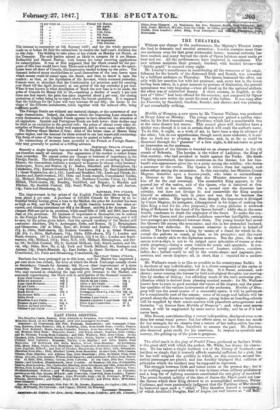Matilda of Hungary, a new opera by Mr. Vincent Wallace,
was produced at Drury Lane on Monday. The young composer gained a sudden repu- tation by his first dramatic essay, Montana; which has considerable run at the .same theatre last season. This second piece will doubtless have a similar run; though it is not so certain that it will exalt the author's name. To do this, it ought, as a work of art, to have been a step in advance of the other; but,,in our apprehension, though much more elaborate, it is nei- ther so. fresh nor so pleasing as Marittma; and, in so far as could be discerned through the " glamour " of a first night, it.did not make so great an impression on the audience.
The subject of the libretto is founded on an obscure incident in the old annals of Bohemia. The heroine is the widow of Ladislaus, the King of that country, who had. perished in battle against the Turks. His death not being ascertained, the Queen continues on the throne; but her hus- band's non-appearance gives rise to a party among the nobility, who desire. a successor to the crown. The Queen is driven from her capital, and takes refuge among the mountains. In this extremity, her Minister, Count. Magnus, stumbles upon a hunter-youth, who bears so extraordinary a likeness to the late King that the Minister determines to pass him off for the real sovereign. The counterfeit King appears, to the general joy of the nation, and of the Queen, who is deceived at first sight as well as her subjects. On a second view she discovers her mistake, but does not divulge it; and meanwhile the King acquits himself so admirably, both in peace and war, that he becomes the , idol of the nation. The upshot is, that, though the imposture is divulged by-Count Magnus, its instigator, (disappointed in his hopes of making the. false King a tool for his own purposes,) the young plebeian is crowned- King of Bohemia by the hand of the-Queen herself ; while she, in the same breath, condemns to death the originator of the fraud. To make the con- duct of the Queen and the -pseudo-Ladislaus somewhat intelligible, certain love-passages are introduced between them. The young hunter had saved- the Queen's life among the mountains; and she, in her pretended husband, recognizes her deliverer. No interest whatever is excited in behalf of either. The hero becomes. a king by means of a fraud, for which he de- served- the gallows as much, at least, as his prompter; and the royal heroine.is nearly akin -to the-Ephesian matron. But the piece, like mostt- operas now-a-days, is not to be judged upon principles of reason or dill-- matic propriety,—being a mere vehicle for music and spectacle. It con- tains the usual quantity of choruses —of hunters, soldiers, courtiers, ladies, &c.; ballads made to sell in the music-shops; and pageants, pro- cessions, and scenic displays; all, in short, that it required for a modern. opera.
Mr. Wallace's music is as like as possible to his countryman Balfe's. It is destitute of any individuality, but is a clever compound of the styles of the fashionable foreign composers of the day. Ibis fluent, animated, and,. showy; never rousing the listener by bold and original thoughts, nor moving him by strokes of feeling; but affording muoh of the mere auricular gra. tification which is derived from pleasing musical sounds: for Mr. Wallace" knows how-to, turn to good account the voices of his singers, and the peen. liar qualities of the varions instruments of the orchestra. Matilda of Hun- • gary will run the usual course of a successful opera: it will be performed. for a considerable part of the season; some of its songs and ballads will be-- ground about the streets on barrel-organs; young ladies at-boarding-schools will be supplied- by their music-masters with pianoforte arrangements and. fantasias "on themes-from Matilda of Hungary"; and, when next 'season. comes, it will be supplanted- by some newer novelty, and be as if it had never been.
Miss Romer., notwithstanding a recent indisposition, displayed even mom, than her usual vocal power; but her effects seem to have been too mrathe for her strength, for we observe that a return of her indisposition has ren- dered it necessary for Miss Rainforth to assume the part. Mr. Harrison also deserved great credit for his exertions. In respect to specticle and scenery, the getting-up of the piece is gorgeous.


























 Previous page
Previous page